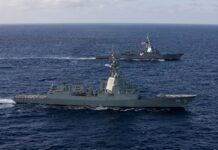AS NOVEMBER ended, the French had not yet delivered the new Mistral-class amphibious attack ship/command ship the Russians had bought from them. Their sailors had gone to sea on board her, they had even complained about some of her features, but the ship had not yet been handed over.
The problem was not the Western sanctions levied against Russia in retaliation for the attack on Ukraine; the French had long since decided to deliver the ship anyway. Reportedly the French had decided to deliver her in October, once the heat over Ukraine had abated. So why the delay now?
No one is saying, but it is probably due to a dispute over payment. That in turn may be an early indicator that the Russian economy is in trouble. The ruble seems to be in free-fall, so there may be a dispute over a previously-agreed price (presumably in Euros) which now equates to a lot more rubles. The ruble, and the Russian economy, is in trouble almost certainly not because of the sanctions levied by the West. The problem is a lot larger: oil.
Oil is Russia’s largest and most lucrative export. Reportedly it accounts for 40% of the Russian national budget. In recent months the price of oil has been crashing, with serious consequences for every country heavily dependent on it. Dramatic and sustained changes in the price of oil is likely to have enormous strategic consequences, not only for the Russians, but for everyone else.
The crash in oil can be traced to changes in both supply and demand. The most spectacular change in supply has been the rise of fracking in the United States and Canada over the past three years, to the point where the United States now rivals Saudi Arabia as an oil producer. In addition, Iraq and Libya are now producing much more oil than in the past, due to dramatic changes in the politics of both (with the caveats that the ongoing war in Iraq may reverse that increase in production, and that Libya is now quite unstable).
On the demand side, although demand from China and India continues to rise, this growth is balanced by the deep European recession, by the lack of Japanese growth, and, to an extent, by the conservation measures adopted throughout the industrialized West. Americans see fracking as the road to energy independence, particularly from the Middle East (though also from overseas suppliers, principally Nigeria and Mexico). However, because the oil market is global, a change in any one market affects all the others.
A crash in oil prices can devastate a country whose economy depends heavily on oil sales. Examples are Iran and Venezuela. In both, revenue from oil has been used to limit popular discontent with the regime. That has meant both maintaining large police forces (such as the Basij militia in Iran) and distributing largesse to the population, particularly to the massive number of poor people. In both countries the government thought it could buy popularity from the large fraction of the population that was impoverished, balancing off discontent among the better-off population. What happens when the government suddenly has too little money to buy stability at the same time that it has other goals?
In Iran, the other goals are military, beginning with expensive nuclear and missile programs. The current negotiations between Iran and other countries make it clear that Iran will not abandon its nuclear program, although the Iranians are willing to do enough to justify reducing sanctions imposed by the West. With the crash in oil prices, withdrawal of sanctions probably will not be nearly enough to solve the government’s fiscal problems, because even without any sanctions oil is Iran’s overwhelmingly important export.
A shortage of cash would seem to present the Mullahs with a stark choice between internal stability (bought by a combination of militia and what amounts to welfare) and the nuclear program. Probably nothing the West can do would present so stark a choice. If the arguments made here are correct, it is the explosion of US fracking which has the best potential for restraining Iranian nuclear and missile ambitions, because when push comes to shove, maintaining itself in power surely matters far more to the regime than a possible means of projecting power. Without internal security, the regime may fall, and nothing else will matter.
Venezuelan oil money funded the late Hugo Chavez’s ‘Bolivarian Revolution’ and his quasi-dictatorship. Even before he died, Venezuela was badly short of money as its oil industry aged and was not modernized, and as Chavez himself outspent its earnings. The US Government saw Chavez as a seriously destabilizing factor in Latin America, encouraging other anti-American regimes and using oil money to subsidize them as they ruined their own economies. Venezuelan oil – and oil money – has been a vital prop for the Cuban regime, which seemed doomed when the Soviet Union and its own support collapsed in 1991. Because Chavez spent far more than his oil industry took in, the country was already in economic trouble when he died. What happens when oil crashes, to perhaps half its earlier price per barrel?
Governments which rely on oil are well aware of the problem, but it has been difficult for them to find a solution. Most, but hardly all, of the major oil producers are members of OPEC (Organization of Oil-Exporting Countries), a cartel formed in 1960 on a Venezuelan initiative. OPEC attempts to set production so as to control world oil prices. Because its membership includes neither the United States nor Russia, OPEC’s writ is limited. By far its most productive member is Saudi Arabia.
In recent months both Iran and Venezuela have argued that OPEC must reduce the supply of oil in order to maintain its price. The Saudis have rejected this argument, on the ground that US and Canadian fracking is the greatest medium-term threat. It costs more to produce oil by fracking than to take it out of the ground in the Middle East (though some reports give higher break-even prices there). The Saudis argue that if a price war drives the price down far enough, the US fracking industry will collapse. The price of oil can then be raised as necessary. This argument may not be entirely sound, because the economics of fracking differs from that of conventional oil wells. Fracking involves both a plant and drilling, much of the cost being the fixed cost of the plant. Once plants have been built, the additional cost of a well is limited. That may mean that, after a point, US oil is not nearly as expensive as some imagine.
If OPEC cuts production in the near future to prop up prices, as Iran and Venezuela have argued it should, then the US fracking problem OPEC faces will get worse. Fracking will become more and more profitable. Unless demand for oil explodes, OPEC will have less and less control over world oil supply and the price of oil. This is the classic way in which a production cartel like OPEC fails. An oil price at which fracking is profitable is apparently well below the price regimes like Iran and Venezuela need.
Note that Russia, like the United States, is outside OPEC. If oil prices do not rise, the only way the Russians can increase revenue is to increase production – which worsens OPEC’s problem.
At some point the demand for oil will surely rise sharply enough to sop up all available production. However, it seems that current relatively low oil prices are set to continue for some time.
That brings us back to Russia. Oil revenue accounts for 40% of its budget, and probably a far larger part of the overall Russian economy. This dominance reflects the failure of post-Communist Russian governments to create an economy based on anything other than selling natural resources. Falling income has stoked inflation, which is now the highest in the industrialized world, outside Ukraine. Russian inflation is also due to Putin’s military build-up, which began in 2008 with a 30% boost in spending. At that time the Russian central banker resigned because he could see disaster coming. That was staved off largely by increased oil revenue, as the price per barrel soared.
The Russians claim that their large reserve of hard foreign currency cushions them against the oil crash (there are questions as to exactly how liquid a lot of it is). Putin has apparently used the economic sanctions imposed on him to reduce imports bleeding him of foreign currency. Most Russians resent the sanctions, which they consider unjust, so they have supported Putin’s ‘counter-sanctions,’ which really amount to restrictions on imports (for example, of food). This is just an example of the reality that sanctions generally cement popular support of the regime they are intended to attack. The story of the French amphibious carrier suggests that Putin’s economy may not be enough to support the military machine he is trying to revive.
Putin may well not have realized that there was a problem, at least at the outset. He was the product of a Soviet command economy which managed to spend about half of its resources on the military. That was ultimately unsustainable, and the attempt to solve Soviet economic and production problems (under Mikhail Gorbachev) destroyed the Soviet system.
Now Putin has a semi-capitalist system in which money has far more meaning than in the past. He must make tradeoffs. Unfortunately one of the central decisions has been to syphon money off to Putin’s cronies. Putin has enforced order among them by periodically destroying a few of them. The lesson is simple: being rich and important does not buy security. As a consequence, much of the money poured into the oligarchs’ super-companies is spirited out of the country (a trend reflected in, for example, purchases of British real estate by rich Russians). This is money which cannot be used to pay for Putin’s military machine. Unfortunately for him, the personnel in that machine are now more expensive than in the past, because Putin has opted for a relatively small professional force instead of a mass of more or less trained draftees. As every major Western government knows, people are the most expensive item in the military budget.
A crash in Russian revenue due to the crash in the price of oil makes it more and more difficult to maintain a substantial professional military force equipped with the best weapons. Several Western powers discovered that one form of military power remained affordable: nuclear weapons, which require minimal numbers of personnel. A recent Russian shift to emphasizing the nuclear aspect of Russian military power suggests that Putin understands. He has not yet learned the other part of the lesson, which is that nuclear weapons are essentially unusable, and that their threat has only a limited value. At the least, the new nuclear emphasis suggests that the falling price of oil and the impact of Russian corruption (reducing hard currency funds in Russia) are biting.
* Norman Friedman is author of The Naval Institute Guide to World Naval Weapon Systems. His column is published with kind permission of the US Naval Institute.




